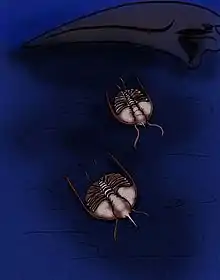Taklamakania
Taklamakania is a genus of asaphid trilobites of the family Raphiophoridae that lived during the late Caradoc of Inner Mongolia, China. Like all raphiophorids it is blind, with a headshield (or cephalon) that is subsemicircular, carrying genal spines and a forward directed spine on the central raised area (or glabella), with the front of the glabella inflated and the natural fracture lines (or sutures) of the cephalon coinciding with its margin. It is easily distinguished from most other raphiophorids by the 3 thorax segments. Pseudampyxina, Nanshanaspis, and Kongqiangheia also have only 3 such segments, but all three lack the frontal spine that emanates from the glabellum of Taklamakania species. All other raphiophorid genera have at least 5 thorax segments. Three species, T. tarimensis, T. tarimheensis, and T. xinjiangensis, have been assigned to this genus sofar.[1]
| Taklamakania | |
|---|---|
 | |
| T. tarimensis | |
| Scientific classification | |
| Kingdom: | Animalia |
| Phylum: | Arthropoda |
| Class: | †Trilobita |
| Order: | †Asaphida |
| Family: | †Raphiophoridae |
| Genus: | †Taklamakania Zhang, 1979 |
| Type species | |
| Taklamakania tarimensis | |
| Species | |
| |
Etymology
The generic name Taklamakania refers to the Taklamakan desert, the area where its fossils were found. The species epithet tarimensis is also a geographic derivation in reference to the Tarim basin, which includes the Taklamakan desert.
Evolution
Adult T. tarimensis are almost indistingishable from juvenile Ampyxina powelli, and it is assumed that Taklamakania developed from Ampyxina through paedomorphosis.[1]
Junior homonym
- T. lepetzi = Paranemia bicolor(Ferrer & Yvinec, 2004) a tenebrionid beetle[2]
References
- Zhou, Z.; Webby, B.D.; Yuan, W. (1995). "Ordovician trilobites from the Yingan Formation of northwestern Tarim, Xinjiang, northwestern China". Alcheringa: An Australasian Journal of Palaeontology. 19 (1): 47–72. doi:10.1080/03115519508619098.
- Medvedev, G.S. (2006). "To the Systematics and Nomenclature of Tenebrionid Beetles of the Tribes Phaleriini, Lachnogyini, Klewariini, and Blaptini (Coleoptera, Tenebrionidae)" (PDF). Entomological Review. 86 (7): 820–839. doi:10.1134/S0013873806070062. Archived from the original (PDF) on 2015-12-22.